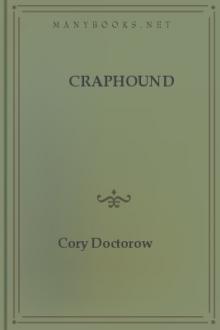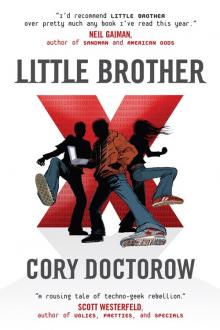Content by Cory Doctorow (first e reader txt) 📕

- Author: Cory Doctorow
- Performer: 1892391813
Book online «Content by Cory Doctorow (first e reader txt) 📕». Author Cory Doctorow
Bargaining leverage is just for starters. The greatest threat that art faces is suppression. Historically, artists have struggled just to make themselves heard, just to safeguard the right to express themselves. Censorship is history’s greatest enemy of art. A limited-liability Web is a Web where anyone can post anything and reach everyone.
What’s more, this privilege isn’t limited to artists. All manner of communication, from the personal introspection in public “diaries” to social chatter on MySpace and Facebook, are now possible. Some artists have taken the bizarre stance that this “trivial” matter is unimportant and thus a poor excuse for allowing hosted services to exist in the first place. This is pretty arrogant: a society where only artists are allowed to impart “important” messages and where the rest of us are supposed to shut up about our loves, hopes, aspirations, jokes, family and wants is hardly a democratic paradise.
Artists are in the free expression business, and technology that helps free expression helps artists. When lowering the cost of copyright enforcement raises the cost of free speech, every artist has a duty to speak out. Our ability to make our art is inextricably linked with the billions of Internet users who use the network to talk about their lives.
$$$$
Giving it Away
(Originally published in Forbes.com, December 2006)
I’ve been giving away my books ever since my first novel came out, and boy has it ever made me a bunch of money.
When my first novel, Down and Out in the Magic Kingdom, was published by Tor Books in January 2003, I also put the entire electronic text of the novel on the Internet under a Creative Commons License that encouraged my readers to copy it far and wide. Within a day, there were 30,000 downloads from my site (and those downloaders were in turn free to make more copies). Three years and six printings later, more than 700,000 copies of the book have been downloaded from my site. The book’s been translated into more languages than I can keep track of, key concepts from it have been adopted for software projects and there are two competing fan audio adaptations online.
Most people who download the book don’t end up buying it, but they wouldn’t have bought it in any event, so I haven’t lost any sales, I’ve just won an audience. A tiny minority of downloaders treat the free e-book as a substitute for the printed book—those are the lost sales. But a much larger minority treat the e-book as an enticement to buy the printed book. They’re gained sales. As long as gained sales outnumber lost sales, I’m ahead of the game. After all, distributing nearly a million copies of my book has cost me nothing.
The thing about an e-book is that it’s a social object. It wants to be copied from friend to friend, beamed from a Palm device, pasted into a mailing list. It begs to be converted to witty signatures at the bottom of e-mails. It is so fluid and intangible that it can spread itself over your whole life. Nothing sells books like a personal recommendation—when I worked in a bookstore, the sweetest words we could hear were “My friend suggested I pick up….” The friend had made the sale for us, we just had to consummate it. In an age of online friendship, e-books trump dead trees for word of mouth.
There are two things that writers ask me about this arrangement: First, does it sell more books, and second, how did you talk your publisher into going for this mad scheme?
There’s no empirical way to prove that giving away books sells more books—but I’ve done this with three novels and a short story collection (and I’ll be doing it with two more novels and another collection in the next year), and my books have consistently outperformed my publisher’s expectations. Comparing their sales to the numbers provided by colleagues suggests that they perform somewhat better than other books from similar writers at similar stages in their careers. But short of going back in time and re-releasing the same books under the same circumstances without the free e-book program, there’s no way to be sure.
What is certain is that every writer who’s tried giving away e-books to sell books has come away satisfied and ready to do it some more.
How did I talk Tor Books into letting me do this? It’s not as if Tor is a spunky dotcom upstart. They’re the largest science fiction publisher in the world, and they’re a division of the German publishing giant Holtzbrinck. They’re not patchouli-scented infohippies who believe that information wants to be free. Rather, they’re canny assessors of the world of science fiction, perhaps the most social of all literary genres. Science fiction is driven by organized fandom, volunteers who put on hundreds of literary conventions in every corner of the globe, every weekend of the year. These intrepid promoters treat books as markers of identity and as cultural artifacts of great import. They evangelize the books they love, form subcultures around them, cite them in political arguments, sometimes they even rearrange their lives and jobs around them.
What’s more, science fiction’s early adopters defined the social character of the Internet itself. Given the high correlation between technical employment and science fiction reading, it was inevitable that the first nontechnical discussion on the Internet would be about science fiction. The online norms of idle chatter, fannish organizing, publishing and leisure are descended from SF fandom, and if any literature has a natural home in cyberspace, it’s science fiction, the literature that coined the very word “cyberspace.”
Indeed, science fiction was the first form of widely pirated literature online, through “bookwarez” channels that contained books that had been hand-scanned, a page at a time, converted to digital text and proofread. Even today, the mostly widely pirated literature online is SF.
Nothing could make me more sanguine about the future. As publisher Tim O’Reilly wrote in his seminal essay, Piracy is Progressive Taxation, “being well-enough known to be pirated [is] a crowning achievement.” I’d rather stake my future on a literature that people care about enough to steal than devote my life to a form that has no home in the dominant medium of the century.
What about that future? Many writers fear that in the future, electronic books will come to substitute more readily for print books, due to changing audiences and improved technology. I am skeptical of this—the codex format has endured for centuries as a simple and elegant answer to the affordances demanded by print, albeit for a relatively small fraction of the population. Most people aren’t and will never be readers—but the people who are readers will be readers forever, and they are positively pervy for paper.
But say it does come to pass that electronic books are all anyone wants.
I don’t think it’s practical to charge for copies of electronic works. Bits aren’t ever going to get harder to copy. So we’ll have to figure out how to charge for something else. That’s not to say you can’t charge for a copy-able bit, but you sure can’t force a reader to pay for access to information anymore.
This isn’t the first time creative entrepreneurs have gone through one of these transitions. Vaudeville performers had to transition to radio, an abrupt shift from having perfect control over who could hear a performance (if they don’t buy a ticket, you throw them out) to no control whatsoever (any family whose 12-year-old could build a crystal set, the day’s equivalent of installing file-sharing software, could tune in). There were business models for radio, but predicting them a priori wasn’t easy. Who could have foreseen that radio’s great fortunes would be had through creating a blanket license, securing a Congressional consent decree, chartering a collecting society and inventing a new form of statistical mathematics to fund it?
Predicting the future of publishing—should the wind change and printed books become obsolete—is just as hard. I don’t know how writers would earn their living in such a world, but I do know that I’ll never find out by turning my back on the Internet. By being in the middle of electronic publishing, by watching what hundreds of thousands of my readers do with my e-books, I get better market intelligence than I could through any other means. As does my publisher. As serious as I am about continuing to work as a writer for the foreseeable future, Tor Books and Holtzbrinck are just as serious. They’ve got even more riding on the future of publishing than me. So when I approached my publisher with this plan to give away books to sell books, it was a no-brainer for them.
It’s good business for me, too. This “market research” of giving away e-books sells printed books. What’s more, having my books more widely read opens many other opportunities for me to earn a living from activities around my writing, such as the Fulbright Chair I got at USC this year, this high-paying article in Forbes, speaking engagements and other opportunities to teach, write and license my work for translation and adaptation. My fans’ tireless evangelism for my work doesn’t just sell books—it sells me.
The golden age of hundreds of writers who lived off of nothing but their royalties is bunkum. Throughout history, writers have relied on day jobs, teaching, grants, inheritances, translation, licensing and other varied sources to make ends meet. The Internet not only sells more books for me, it also gives me more opportunities to earn my keep through writing-related activities.
There has never been a time when more people were reading more words by more authors. The Internet is a literary world of written words. What a fine thing that is for writers.
$$$$
Science Fiction is the Only Literature People Care Enough About to Steal on the Internet
(Originally published in Locus Magazine, July 2006)
As a science fiction writer, no piece of news could make me more hopeful. It beats the hell out of the alternative — a future where the dominant, pluripotent, ubiquitous medium has no place for science fiction literature.
When radio and records were invented, they were pretty bad news for the performers of the day. Live performance demanded charisma, the ability to really put on a magnetic show in front of a crowd. It didn’t matter how technically accomplished you were: if you stood like a statue on stage, no one wanted to see you do your thing. On the other hand, you succeeded as a mediocre player, provided you attacked your performance with a lot of brio.
Radio was clearly good news for musicians — lots more musicians were able to make lots more music, reaching lots more people and making lots more money. It turned performance into an industry, which is what happens when you add technology to art. But it was terrible news for charismatics. It put them out on the street, stuck them with flipping burgers and driving taxis. They knew it, too. Performers lobbied to have the Marconi radio banned, to send Marconi back to the drawing board, charged with inventing a radio they could charge admission to. “We’re charismatics, we do something as old and holy as the first story told before the first fire in the first cave. What right have you to insist that we should become mere clerks, working in an obscure back-room, leaving you to commune with our audiences on our behalf?”
Technology giveth and technology taketh away. Seventy years later, Napster showed us that, as William Gibson noted, “We may be at the end of the brief period during which it is possible to charge for recorded music.” Surely we’re at the end of the period where





Comments (0)